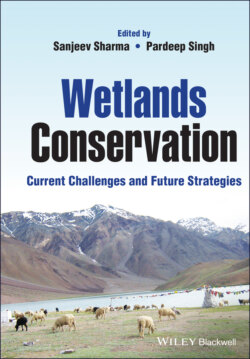Читать книгу Wetlands Conservation - Группа авторов - Страница 15
1.2 Importance of Wetland Ecosystem
ОглавлениеWetlands are vital for human prosperity and regulating the environmental system. Since the beginning of human civilization on this planet earth, wetlands have been a lifeline for human civilisations. Civilizations have flourished mainly along the periphery of the wetland ecosystems. The wetlands are ecosystem stems; they serve a range of purposes for the well‐being of humans and support the natural flow of ecosystem system, such as management and monitoring of the natural ecological and environmental processes (Figure 1.1). The regulatory system is essential for the protection of the human and planet health (Schuyt and Brander 2004). Wetlands are considered to be natural surface water and groundwater purifiers, water rechargers, recyclers of nutrients and human waste. They are essential to protect watersheds, to monitor climate and disasters such as floods, droughts, ecosystems for rich biodiversity, to stabilise shorelines, to desynchronize flood flows to constitute a major source of carbon sinks etc. (Kusler et al. 1994; Kraus 1995). Environment roles arise from a range of biological and physical interactions and interdependence of the socio‐ecological system. The wetland systems are a class of land cover that is ecologically fragile and highly susceptible to anthropogenic pressure and climate change. Through potential or close potential evapotranspiration, wetlands directly influence the global and local/regional ecosystems by exchanging water, heat and energy with surrounding as well as regional atmosphere composition and climate (Fan et al. 2010). Russi et al. (2013) observed that wetlands get engaged in the global biogeochemical cycle through greenhouse gas emissions and carbon dioxide sequestration and indirectly influence the environment from local to global scale. The collaborative environment of biological and geochemical processes in the wetlands contribute to emission of greenhouse gases. The wetlands systems are the largest source of methane (CH4) in the world, and the only one dominated by the atmosphere (Prigent et al. 2001; Bousquet et al. 2011). Many of these tasks are often essential for individuals, directly or indirectly, and are therefore continually influenced by human activities (Reis et al., 2017 & 2019).
Figure 1.1 Ecosystem services from wetlands system
Source: Ramsar Convention (2018) and Gardner and Finlayson (2018) © Ramsar Convention Secretariat.
Wetlands are resourceful for humankind as they perform many significant functions. Wetlands are essential for the provision of ecosystem system services for human beings' and they are survival and safeguard of the natural ecosystems. Wetlands system are world's most biological productive ecosystems and account for 47% of the global ecosystem's value. They provide essential tangible and non‐ecosystem services for biotic and abiotic components of the environment (MEA 2005; Russi et al. 2013). Wetlands, including natural and artificial wetlands, ponds, rivers, swamps, marshes, peatlands, mangroves, and coral reefs, are major sources of ecosystem services and contribute in regulating the ecological system and people's livelihoods. Wetlands are also known as “the kidney of the earth system” and believed to be the cradle of animals and plants. The wetlands are the most biologically diverse ecosystems and act as source and purifier of water on earth. Wetlands can filter pollution from the water and remove toxins and pollutants from the aquatic system due to their high and long‐term capacity to filter pollution from the water. These wetlands are helping to protect humanity by conserving natural resources from natural hazards like floods, droughts and many other disasters. Wetlands are the major storehouse of carbon than any other system and the production of food, fibre and ecotourism services (Mitsch and Gosselink 2000; Keddy 2010; Junk et al. 2013).
Since 1970, more than 35% of the wetlands have been lost which is more than three times greater than forest loss (Global wetlands Outlook‐2018). In controlling the hydrological process, wetlands play a vital role. The wetland systems regulate the movement of water supply, replenish groundwater, purify surface water, underground water, and manage and monitor the hydrological cycle phase. The ecology of wetlands plays a crucial role in well‐being of human beings and all other species of flora, fauna, climate change adaptation, biodiversity conservation, hydrology and soil conservation, and protection of the health of the planet (Ramsar Convention Bureau 2001). Centred on the principle of conventional medical practices and providing help for human health, 80% of the world's population relies primarily on health care services in these wetlands.
Wetlands are universally considered to be one of the primary natural pools of greenhouse gas methane (CH4) emission as they contributing 20–40% of the total annual emissions to the atmosphere, which adds a robust radiative forcing from CH4 (Bousqet al. al. 2011; Qin et al. 2014). Wetland ecosystem plays an extremely significant part in influencing the global climate system by biogeochemical feedback mechanisms (Seneviratne et al. 2010; Fisher et al. 2011).
